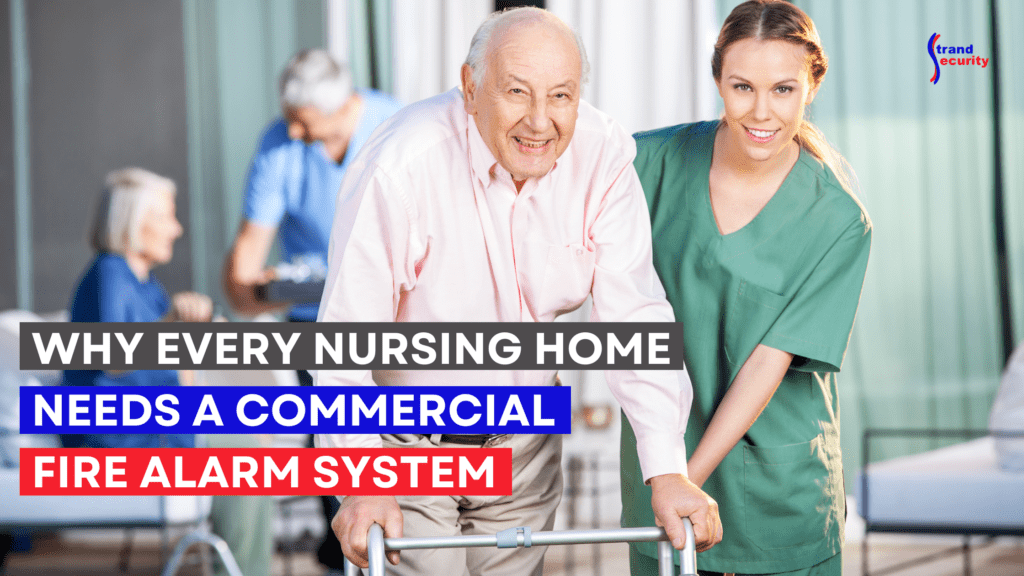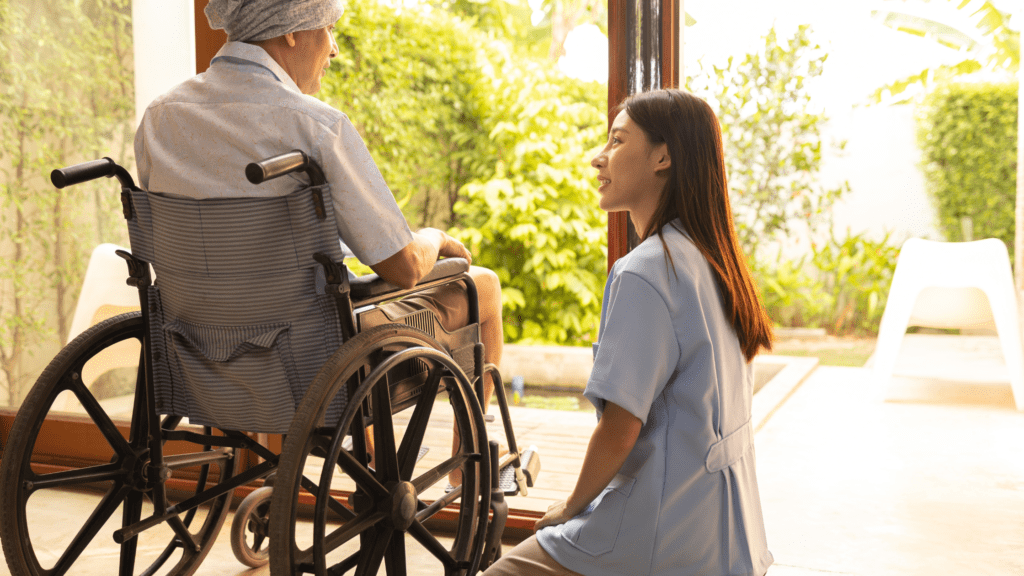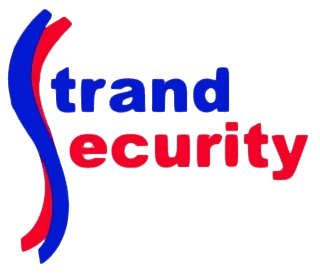Why Every Nursing Home Needs a Commercial Fire Alarm System
The Myrtle Beach area, stretching along the Grand Strand in South Carolina, is a haven for retirees seeking a warm climate and beautiful beaches. Many flock here as snowbirds during the winter months, drawn to the sunshine and relaxed pace of life.
This influx has contributed to a growing need for senior care facilities, including nursing homes. As the number of nursing homes increases, so does the critical need to prioritize the safety of their residents.

Here’s why every nursing home, especially in Myrtle Beach, should have a top-notch commercial fire alarm system.
Safeguarding Lives: Why Nursing Homes Need Commercial Fire Alarm Systems
In a nursing home setting, ensuring the safety of residents is paramount. Unlike other residential environments, nursing homes house individuals with varying degrees of mobility and cognitive abilities. Some residents may require assistance with daily activities, while others may have limited awareness or reaction times.

This heightened vulnerability makes fire safety a top concern. A properly functioning commercial fire alarm system plays a critical role in safeguarding lives in the event of a fire.
Early detection and immediate notification are essential for a swift and safe evacuation, especially for residents who may need additional support in an emergency.
Early Detection is Key: Advantages of Commercial Fire Alarm Systems in Nursing Homes
Early detection is the cornerstone of fire safety in any building, but it’s especially crucial in nursing homes. Commercial fire alarm systems offer several distinct advantages over traditional smoke detectors:
- Faster Response Times: These systems are designed for immediate and widespread notification. A loud and clear alarm will sound throughout the facility the moment smoke or heat is detected, providing precious seconds for staff to react and initiate evacuation procedures.
- 24/7 Monitoring (Optional): Many commercial fire alarm systems can be linked to a central monitoring station. This ensures that even if no staff is present during a fire event, emergency services will be dispatched immediately, minimizing response times.
- Zoned Detection: Commercial systems can be divided into specific zones within the nursing home. This allows staff to pinpoint the exact location of the fire quickly, facilitating targeted evacuation efforts and minimizing confusion.
- Interconnectivity: These systems can integrate with other life safety features like fire doors and elevators, automatically triggering actions that can help contain the fire and improve safe egress.

By providing early and accurate fire detection, commercial fire alarm systems give nursing home staff the critical time needed to respond effectively and ensure the safety of residents in the event of an emergency.
Meeting Compliance Standards: Nursing Home Commercial Fire Alarm System Requirements
In South Carolina, ensuring the safety of nursing home residents is a top priority reflected in strict fire safety regulations. Nursing homes must adhere to the provisions of the International Building Code (IBC) and the International Fire Code (IFC), as adopted by the state. These codes mandate the installation and maintenance of appropriate commercial fire alarm systems.
It’s important to remember that specific requirements may vary depending on the size, occupancy level, and layout of your nursing home.

However, all nursing homes in South Carolina should have a commercial fire alarm system that meets these general criteria:
- Early Warning Detection: The system must be capable of detecting smoke and heat throughout the entire facility. This includes resident rooms, common areas, hallways, staff stations, and any other occupied spaces. Early detection is crucial for a swift response before a fire can spread.
- Audible and Visual Alarms: A loud and clear alarm must be audible throughout the building to alert residents and staff of a potential fire emergency. Additionally, visual strobes or lights are often required to accommodate residents with hearing impairments, ensuring everyone is notified in case of danger.
- Manual Pull Stations: Strategically placed manual pull stations allow staff and residents to activate the alarm system even if a fire isn’t automatically detected. This provides an extra layer of safety and empowers occupants to take action if they see flames or smoke.
- Emergency Evacuation Signaling: The fire alarm system may need to be integrated with emergency voice communication systems. This allows staff to provide clear instructions and facilitate safe evacuation procedures during a fire event. Clear communication is vital for ensuring everyone can exit the building safely, especially residents who may require assistance.

Double-Checking Requirements with a Building Code Assessor
While this provides a general overview, it’s crucial to consult with a qualified building code assessor or fire protection engineer familiar with South Carolina regulations. They can conduct a thorough inspection of your nursing home and ensure your commercial fire alarm system meets all applicable codes and standards.

This extra step not only guarantees compliance with the law but also provides the highest level of safety for your residents and staff. Remember, fire safety is paramount, and a properly functioning commercial fire alarm system can save lives.
Choosing the Right System: Considerations for Nursing Home Commercial Fire Alarm Systems
Selecting the right commercial fire alarm system for your nursing home goes beyond just meeting code requirements. Here are some key considerations to ensure the system seamlessly integrates with your facility’s needs and optimizes resident safety:
- Resident Needs and Capabilities: Consider the varying mobility and cognitive abilities of your residents. Look for systems with features like voice evacuation messages to guide residents who may be visually impaired or require additional instructions. Strobe lights are also crucial for those with hearing limitations.
- System Reliability and Durability: Nursing homes operate 24/7. Choose a system with a proven track record of reliability and durability. Regular maintenance is essential, so ensure the chosen system is easy to service and has readily available replacement parts.
- Scalability and Future Planning: Nursing homes can evolve over time. Opt for a system that can be easily expanded or modified to accommodate future growth or changes in layout.
- Integration Capabilities: Consider integrating your fire alarm system with other safety features like fire doors and sprinkler systems. This creates a more comprehensive fire protection network and streamlines automatic responses in case of an emergency.
- Ease of Use for Staff: The system should be user-friendly for staff, including those with limited technical experience. Intuitive interfaces and clear training materials are essential for ensuring staff can operate the system effectively during an emergency.
By carefully considering these factors in addition to adhering to local fire codes, you can choose a commercial fire alarm system that provides the highest level of protection tailored to the specific needs of your nursing home and its residents.

Partnering for Peace of Mind: How a Reputable Fire Alarm Company Can Help Your Nursing Home
Ensuring the safety of your nursing home residents should be your top priority. A properly functioning commercial fire alarm system is a cornerstone of fire safety in any nursing home, but navigating the selection, installation, and maintenance process can seem daunting. This is where partnering with a reputable fire alarm company becomes invaluable.

At Strand Security, a trusted security and technology provider in the Myrtle Beach area for over 10 years, we possess the experience and expertise to guide you every step of the way.
Here’s how we can help your nursing home achieve optimal fire safety:
- Customized System Selection: Our team will work closely with you to understand your nursing home’s unique layout, resident needs, and compliance requirements. We’ll then recommend a commercial fire alarm system specifically tailored to provide the highest level of protection for your facility.
- Seamless Installation: Our highly trained and certified technicians will handle the entire installation process efficiently and with minimal disruption to your daily operations. They’ll ensure the system is properly integrated with your existing infrastructure and adheres to all applicable fire codes.
- Ongoing Maintenance and Support: Strand Security doesn’t stop at installation. We offer comprehensive maintenance plans to ensure your fire alarm system remains in peak condition and ready to respond in case of an emergency. Our technicians will perform regular inspections, testing, and cleaning to guarantee optimal system functionality.
- 24/7 Peace of Mind: Many commercial fire alarm systems can be monitored by a central station. Partnering with Strand Security allows you to access this valuable service. In the event of a fire, even if no staff is present, the monitoring station will be notified immediately and dispatch emergency responders, providing an extra layer of security and ensuring a swift response.
At Strand Security, we understand the critical role fire safety plays in nursing homes. Our commitment goes beyond simply selling equipment; we prioritize the well-being of your residents and staff. Contact us today for a free consultation and let our fire alarm specialists help you create a safer environment for everyone in your nursing home.
